

Yukkuri Shiteitte ne! About Yukkuri Shiteitte ne!
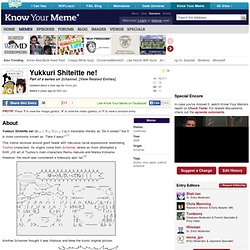
(ゆっくりしていってね!) Translates literally as “Do it slowly!” But it is more commonly known as “Take it easy!” This meme revolves around giant heads with ridiculous facial expressions resembling Touhou characters. Another 2channer thought it was hilarious and drew the iconic original picture: Here’s a more traditonal version of how Reimu and Marisa appear. But their fat-headed appearance in the 2channel Yukkuri “re-draw” caught on, becoming an epic meme in Japan. Spread Yukkuri’s popularity soon spread to 4chan’s /jp/ board, appealing to a wider anime audience. Although Yukkuris started with a large Touhou base, recently it has expanded beyond Touhou; anything with a face can be turned into a Yukkuri. Media. Mikan-Seijin (Extraterrestrial Oranges) About Mikan-Seijin or “Alien from the planet Tangerine” is an anthropomorphic tangerine (often mischaracterized as an orange) created by Kazuma Shirasaki in 1989 and licensed in 1992 for use in a number of short animations on “UgoUgoLuga” (Fuji Television Network, Inc.)
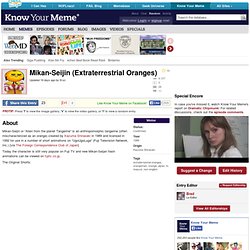
[via The Foreign Correspondence Club of Japan] Weeaboo. About Weeaboo (a.k.a Wapanese) is an English slang used to describe a person (typically of non-Asian descent) who prefers Japan and all things in Japanese over one’s indigenous culture.
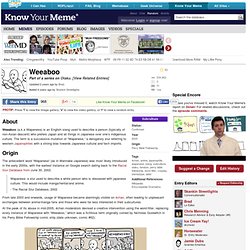
The term is a successive mutation of “Wapanese,” a derogatory slur referring to western Japanophiles with a strong bias towards Japanese cultural and tech imports. Origin The antecedent word “Wapanese” (as in Wannabe Japanese) was most likely introduced in the early 2000s, with the earliest instance on Google search dating back to the Racial Slur Database from June 30, 2002. Wapanese: a slur used to describe a white person who is obssesed with japanese culture. From late 2003 and onwards, usage of Wapanese became alarmingly visible on 4chan, often leading to unpleasant exchanges between anime/manga fans and those who were far less interested in their subcultures. In its original context, the word “weeaboo” doesn’t signify anything but something undesirable and deserving punishment. Mai Waifu. About Waifu is an Engrish term primarily used by Asian men to refer to one’s own wife.
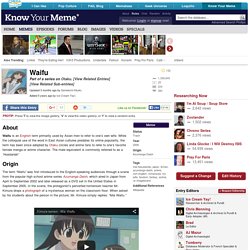
While the colloquial use of the word in East Asian cultures predates its online popularity, the term has been since adopted by Otaku circles and anime fans to refer to one’s favorite female manga or anime character. The male equivalent is commonly referred to as a “Husbando” Origin The term “Waifu” was first introduced to the English-speaking audiences through a scene from the popular high school anime series Azumanga Daioh, which aired in Japan from April to September 2002 and later released as a DVD set in the United States in September 2005. Spread The Engrish word “waifu” stuck with the English-speaking fans and throughout the latter half of 2000s, the term became heavily used by both anime fans and trolls on 4chan’s /a/ (anime & manga) board, as a term of endearment to refer to a female character and as a flamebait to mock the obsessive nature of the subculture, respectively.
Desu. About Desu (Japanese: です) is a Japanese word that is used by both fans of Japanese culture and those who mock the former.
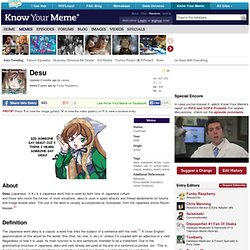
In most situations, desu is used in spam attacks and thread derailments on forums and image boards alike. The use of the word is usually accompanied by Suiseiseki, from the Japanese anime Rozen Maiden. Definition The Japanese word desu is a copula: a word that links the subject of a sentence with the verb. Other Japanese copulas are da, de, wa, na, and more. Pronunciation In standard Tokyo dialect, the u in “desu” is not pronounced, as if it were spelled “des.” 4chan The earliest memetic usage of the word desu as a method of spam attack began in 2006 in a retaliatory forum raid on 4chan’s random image board, /b/. Image macros using the word desu or images of Suiseiseki are used commonly on 4chan by fans of anime (sometimes referred to by the derogatory term weeaboo ), and by those mocking them. Rozen Maiden Notable Derivative: Moshi Moshi X Desu Related Meme: Gaston. Otaku. About Otaku (おたく/オタク) is a Japanese slang term used to describe someone who has obsessive interests in specialized subcultures and hobbies, particularly in regard to anime, manga, pop idols and video games.
With the international success of Japanese cultural imports, the term has gained recognition among manga/anime/j-pop fans overseas. In English, it is usually used to refer to an obsessive fan of anime/manga and/or Japanese culture generally, and to a lesser extent Japanese video games. Online History While the term “Otaku” is somewhat comparable to the Western-derived word “Maniakku” (literally meaning maniac), the nuance of “Maniakku” is significantly softer and less likely to cause offense than “Otaku”. Reception [researching] Subtypes of Otaku-dom. Touhou Project (東方Project) About Touhou Project (Japanese: 東方Project Tōhō Purojekuto) is a series of PC-9801 and Windows scrolling manic shooter games created by Team Shanghai Alice’s sole member, ZUN.
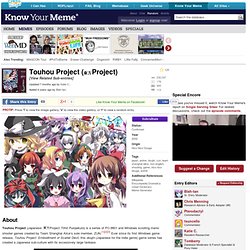
Ever since its first Windows game release, Touhou Project: Embodiment of Scarlet Devil, this doujin (Japanese for the indie genre) game series has created a Japanese sub-culture with its excessively large fanbase. Development The first five Touhou games were developed for the Japanese PC-9801 platform by a group called Amusement Makers.